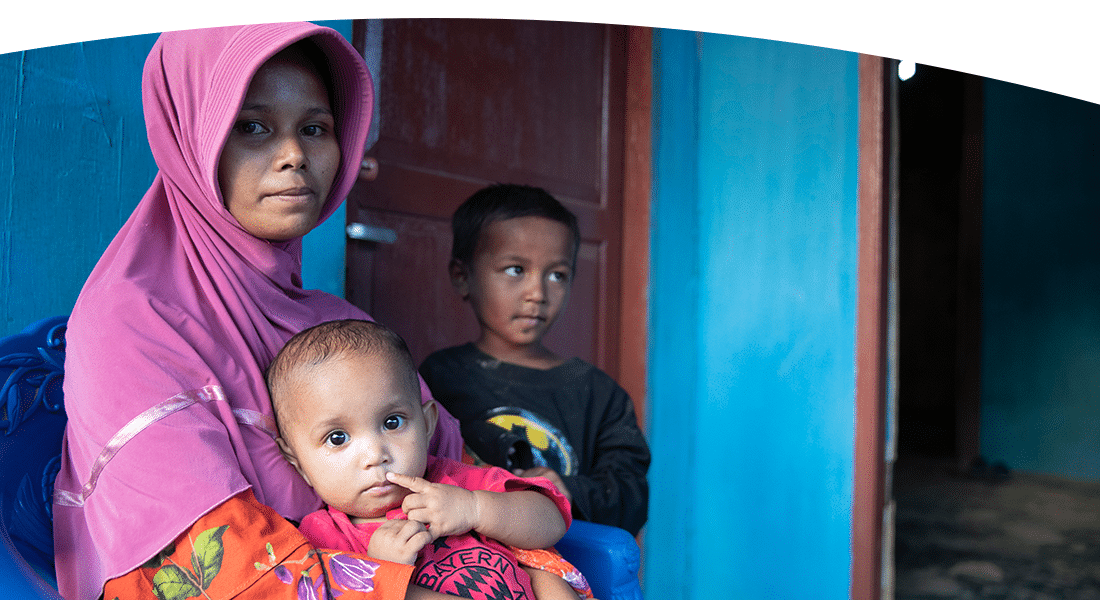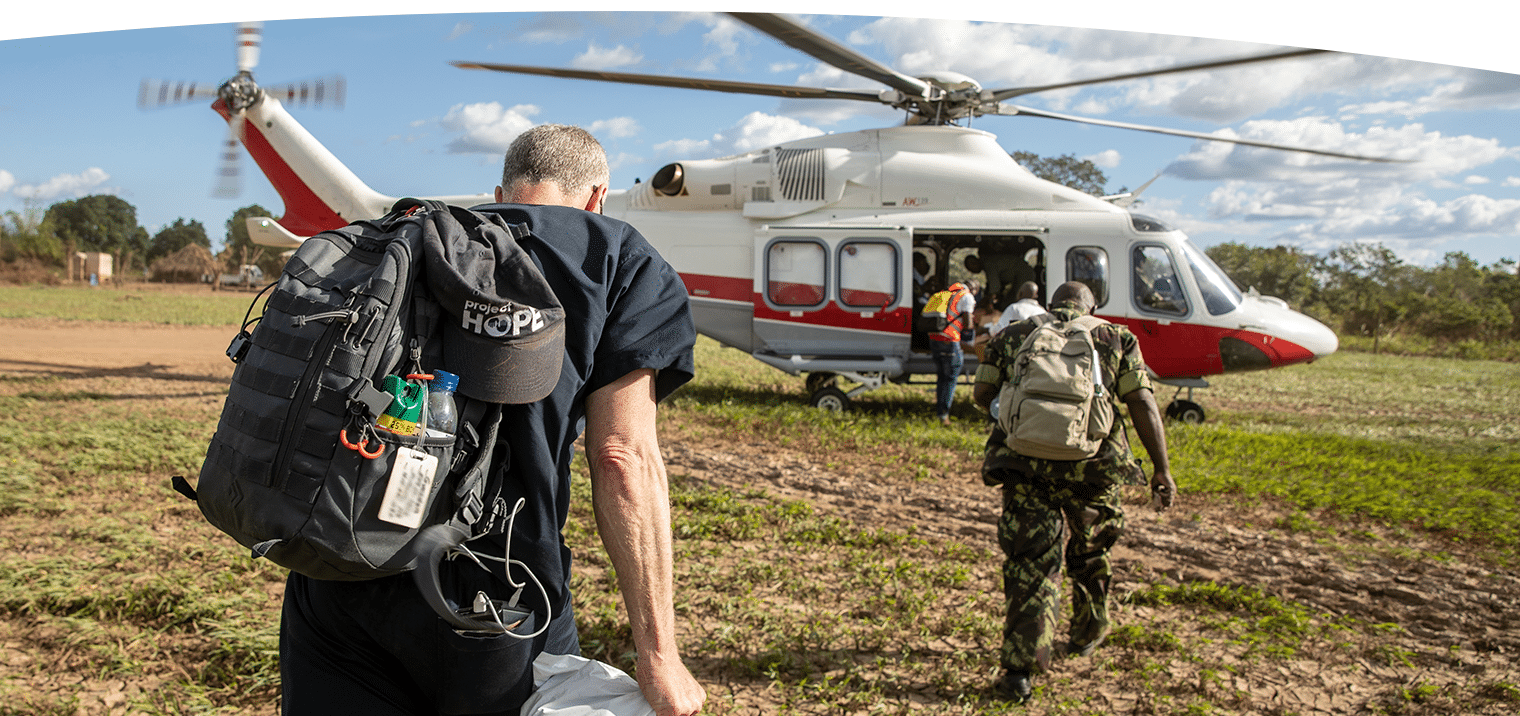
Disaster & Emergency Response
Project HOPE responds to disasters and health crises around the world, providing immediate relief and helping strengthen local health systems for the long term.
 Project HOPE is on the ground responding to crises around the world. Read more about our responses and how you can help.
Project HOPE is on the ground responding to crises around the world. Read more about our responses and how you can help.
When disaster strikes, Project HOPE is there.
Violent conflict. Deadly disease outbreaks. Record-breaking storms.
While their origins may vary, the result is the same: the health of millions of families is on the line.
We are up against a scale of suffering that cannot be ignored. As the world’s crises compound, its poorest countries bear the cost: hospitals and clinics underequipped, communities underprepared, families unable to go without food, clean water, or medicine.
We’re building a different world — a global community of health workers who have the skills they need to heal people. Hospitals and clinics that won’t be shaken by disaster. Families that have access to incredible advancements in technology and medicine.
Project HOPE has responded to every major disaster since the 2004 Indian Ocean tsunami. Throughout our history, we’ve shown up on the front lines of the world’s most urgent natural disasters and humanitarian crises: from the Ukraine crisis, to the 2021 Haiti earthquake, to Hurricane Dorian in the Bahamas, Cyclone Idai in Mozambique, and the COVID-19 pandemic.
We deploy staff and volunteers to provide critical medical support. We deliver lifesaving medicine and relief. And we stay long after the headlines fade to help health systems rebuild.
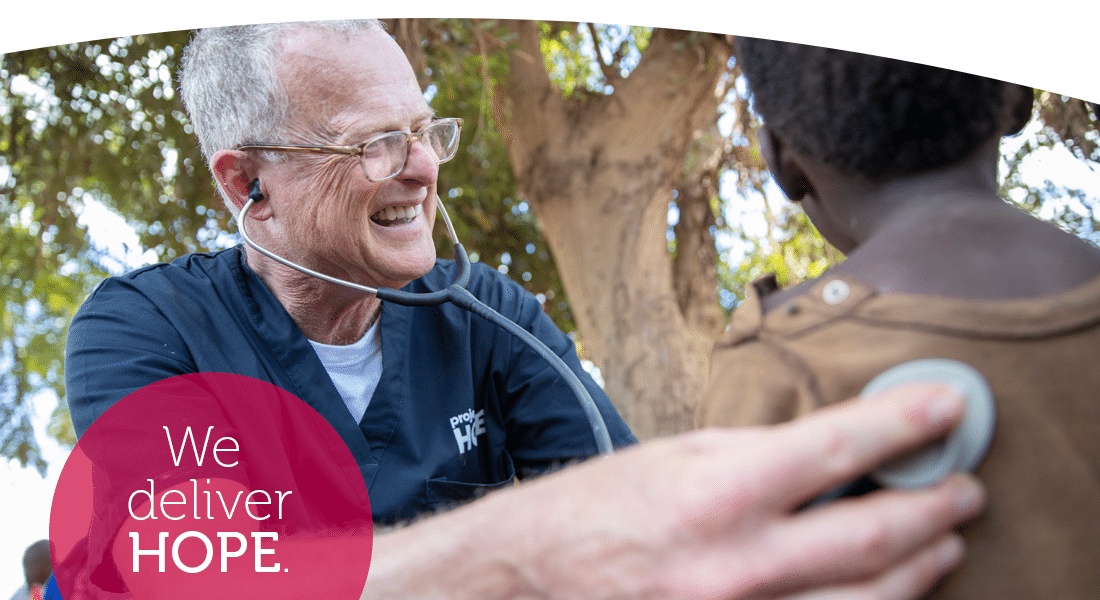
Our no regrets approach
There’s a critical window of time to save lives after a disaster—only a moment to decide if your team will go or stay, before it’s too late.
At HOPE, we take a “no regrets” approach to responding in times of disaster: We get there fast, we start working quickly, and we stay as long as we have the resources to meet the needs.
By responding with no regrets, we commit to moving as quickly as we can to show up to the front lines and support local authorities. Because when the need is greatest, so is the chance for impact.
For more than 60 years, HOPE has helped heal people and transform lives in more than 100 countries around the world, relying on the expertise of our field teams to strengthen our ability to respond in times of emergency.
“I believe a “no regrets” approach is critical to an organization like ours. There will always be things we don’t know, but when it falls to us to respond, it doesn’t matter: our job is to act first and correct our course as we go, holding always to a do-no-harm approach and the humanitarian principles we were founded on.”
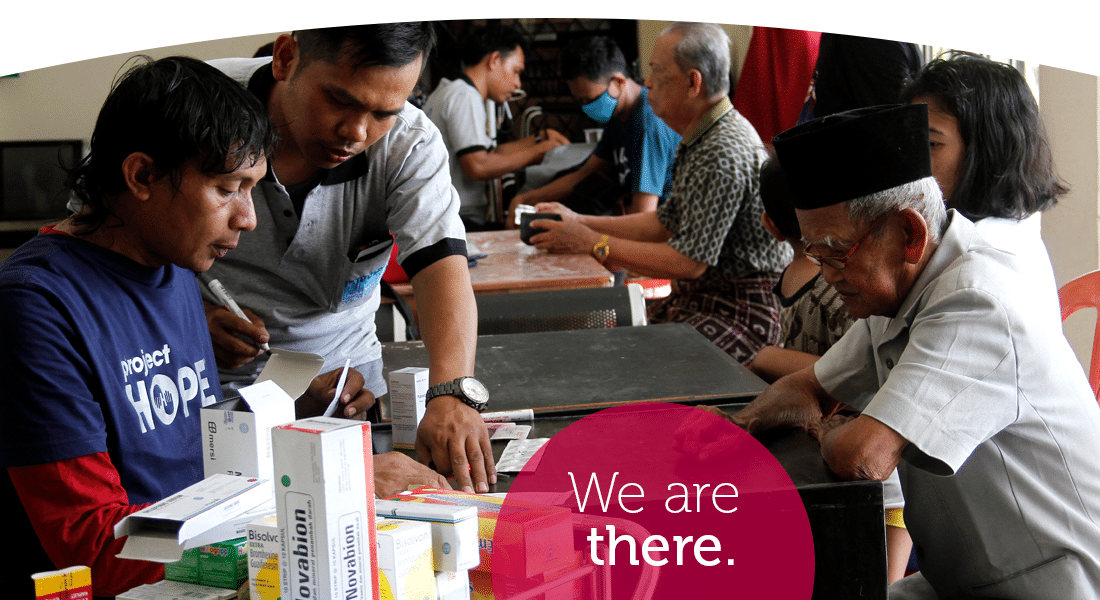

How We Provide Hope
In disaster and crisis, Project HOPE works within health systems around the world to empower health workers with the training and tools they need to save lives.
In the short term:
- We deploy expert staff and volunteers to respond to health and infrastructure needs.
- We mobilize mobile medical units to affected and remote communities in need of urgent care and pharmaceuticals.
- We distribute medicines and relief supplies based on needs outlined by ministries of health and health facilities.
- We do whatever is needed to immediately save lives and protect the health and wellbeing of vulnerable communities.
In the longer term:
- We strengthen health care systems by repairing clinics, WASH systems, supply chain improvements to keep medicines safe and ensure their availability, and more.
- We improve the skills and knowledge of local health workers priority areas like emergency obstetric care and rehabilitation so they are more prepared for the future.
- We help communities become more resilient by providing emergency preparedness training and guidance.
We know that an emergency response is only sustainable with the earned support of local governments. Our longstanding partnerships with local organizations and ministries of health are essential to our ability to respond effectively and help communities build back stronger.
When Emergencies Arise, Speed Saves Lives
When crisis strikes, every second matters. We don’t waste time: Our goal is to be on the scene and operational within 48 hours, helping support local health systems, prevent disease and save lives.
We deploy a multi-disciplinary advance team first to assess conditions on the ground and coordinate with local organizations and ministries of health to identify gaps in health services and infrastructure. We begin relief efforts as soon as possible based on what communities need most, providing expert medical volunteers to complement local efforts and provide the health services people need.
We also distribute in-kind aid, working quickly to gain access to affected areas and organize shipments of lifesaving medicines and relief supplies to reach the most vulnerable communities.
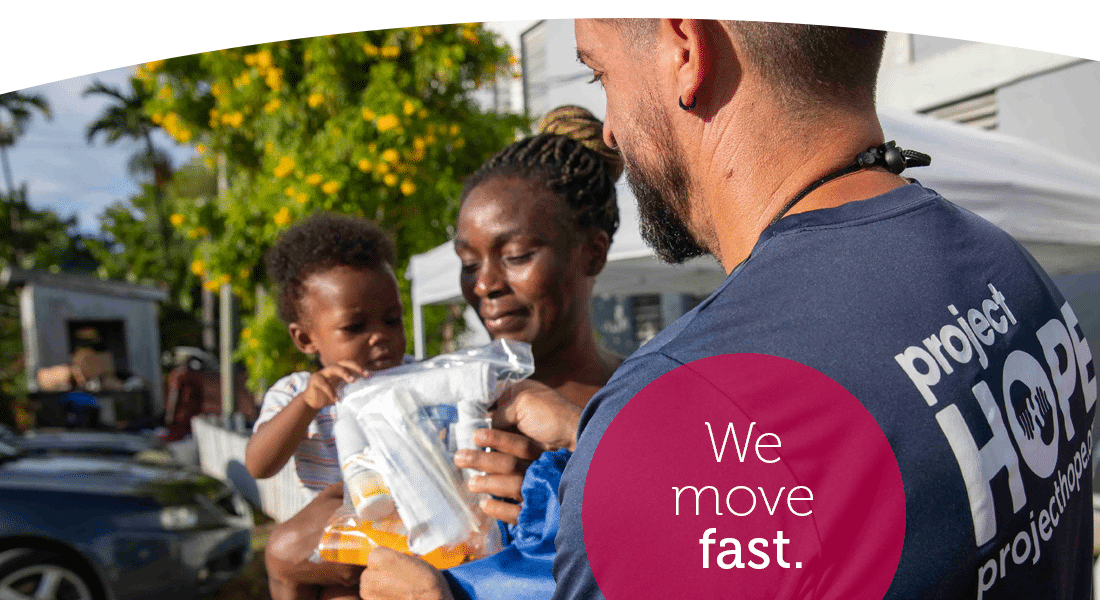
Delivering Hope for Years To Come
Recovery never happens overnight. It often takes years for survivors to fully rebuild from disaster. Not all wounds are physical, and sometimes the loss can last a lifetime.
We stay for the long haul, until communities have a chance to rebound, build back, and prepare to face the next disaster. To do so, we work closely with ministries of health and local partners to determine how we can help—whether by restoring access to clean water and sanitation, repairing health facilities, or training communities in first-aid.
Emergency response is never just the days and weeks following a disaster—it’s an entire cycle of response, recovery and preparedness. It’s why we’re still on the ground in Puerto Rico, the Bahamas, and Indonesia today.

Recent responses
Israel-Gaza conflict
Project HOPE has emergency response personnel in Israel and Egypt coordinating with local authorities, UN agencies, and civil society to coordinate the delivery of aid for both Israel and Gaza. Learn more about our response.
Earthquake in Morocco
Project HOPE is responding to the earthquake in Morocco in partnership with our long-time partners SAMU, a Spanish medical emergency organization, who are providing search and rescue operations on the ground near the earthquake’s epicenter. Learn more about our response.
Conflict in Sudan
Project HOPE responded to the widespread humanitarian crisis in Sudan through our local partner, Nada Elazhar for Disaster Prevention and Sustainable Development (NADA). As part of the response, NADA provided support to displaced families and refugees in North Darfur State and Northern State through comprehensive case management, counseling, provision of medications, and referral services to higher-level care. Read about our full response in our latest situation report here.
Earthquakes in Türkiye and Syria
In the immediate aftermath of the 7.8-magnitude earthquake that struck Türkiye and Syria on February 6, 2023, Project HOPE’s Emergency Response Team worked quickly to distribute shelter containers, hygiene kits, and medical supplies – including generators, infant incubators, and more than 2,500 pounds of medication.
Our team on the ground has completed support on long-term relief efforts. We responded to health, hygiene, and protection needs in the region and planning mental health and psychosocial support activities in the affected area for survivors dealing with the long-term impacts of trauma. Learn more here.
Ukraine Crisis
Project HOPE is on the ground and is coordinating with local organizations in Ukraine, Poland, Moldova, and Romania to provide urgent medicines, medical supplies, and emergency relief in response to the Russian invasion of Ukraine. Learn more here.
COVID-19 Pandemic
Project HOPE has launched a global response to the COVID-19 pandemic that is supporting frontline health care workers, expanding vaccine access, and providing medical surge support where needed worldwide.
See our other responses>>

Get the facts
Natural Disasters
Extreme weather displaced more than 17 million people from their homes last year — that’s more than the populations of Sierra Leone and Lebanon combined.
As the climate crisis intensifies, so does the threat of natural disasters. In places highly vulnerable to the effects of climate change, like Indonesia and Puerto Rico, people live under constant threat of the next disaster. The fear of earthquakes, hurricanes, and tsunamis is passed down through the generations.
Climate change is already taking a major toll on our health. It threatens the air we breathe, the water we drink, and the food we eat. It’s also leading to more frequent and catastrophic weather events — disasters like hurricanes, earthquakes, tsunamis, floods, and volcanic eruptions that level entire cities and expose survivors to major health risks and chronic emergencies.
It’s time to get ahead of the forecast. We stand ready to respond in times of emergency, but we’re also training health workers, equipping hospitals, and working within communities to build resilience to the impacts of climate change.
- 5 million people will die from climate change this year
- Over 17 million people were displaced by extreme weather last year
- All of the world’s worst food crises are linked to both conflict and climate shocks
“Climate change contributes directly to increases in morbidity and mortality, displacement and conflict. Climate change is not a political issue: human lives are at stake, and we can’t afford to sit by and not do anything about it.”
Health crises
We live in a more densely populated world than ever before, which presents health concerns with potentially grave consequences. Under the microscope, the threat of various health crises is rapidly rising.
In emergency, disruptions in safe water and sanitation services increase the risk of diseases like malaria, dengue fever and cholera. Emergencies also exacerbate preexisting health conditions: Patients already suffering from noncommunicable diseases (the leading cause of death in the world) struggle to access medications or facilities for treatment.
Meanwhile, the risk of a global pandemic is growing. Diseases like Ebola, Zika and Lyme could all cause an epidemic of worldwide proportions—a battle that would be hard to fight with the current global shortage of health workers.
We’re committed to responding quickly and effectively to outbreaks around the world. To reduce vulnerability to disaster, we’re providing health education to communities and empowering health workers to effectively prevent, manage and treat diseases and provide quality care.
- 2 billion people are at risk of or exposed to crisis conditions
- The world needs 18 million more health workers by 2030
- 21% of Sierra Leone’s workforce died in the 2014 Ebola epidemic
“We live in a more densely populated and interconnected world than ever before. We’ve already seen what the threat of infectious disease can be — and that threat continues to grow.”
Humanitarian emergencies
Yemen. Syria. Venezuela. We see them in the headlines every day, yet it’s impossible to imagine the scale of need facing families who have to endure the world’s worst humanitarian crises.
Conflict and displacement are causing widespread desperation around the world.
Over 70 million people have been forced from home, fleeing conflict or persecution, violence or human rights violations. Displacement heightens the risk of major health concerns including malnutrition and disease, as families struggle to access essential resources like food, clean water, sanitation and medication. Finding medical attention in such circumstances is a blessing, never a guarantee — it’s not uncommon for people living in these crises to walk hundreds of miles to reach a doctor or nurse.
Health systems in these contexts simply don’t have enough staff or resources to meet the scale of need. It requires a global response. In Colombia, we’re providing urgent medical support for Venezuelan migrants and refugees so understaffed health facilities don’t have to turn people away. In Yemen, we’re working through the Humanitarian Alliance for Yemen to help deliver food, medicines and medical supplies to those who need it most.
- An unprecedented 70 million people are displaced worldwide
- In 2020, nearly 168 million people need humanitarian assistance and protection
- Millions more are at risk of being pushed into humanitarian crisis

How you can help
Make a lifesaving gift to support our work now and for the future at projecthope.org/donate.
Are you a health-care or other professional who would like to learn more about volunteering abroad with Project HOPE? Learn more about our volunteer program and join our volunteer roster.
Stay up-to-date on this story and our lifesaving work around the world by following us on Facebook, Instagram, LinkedIn and Twitter, and help spread the word by sharing stories that move and inspire you.
